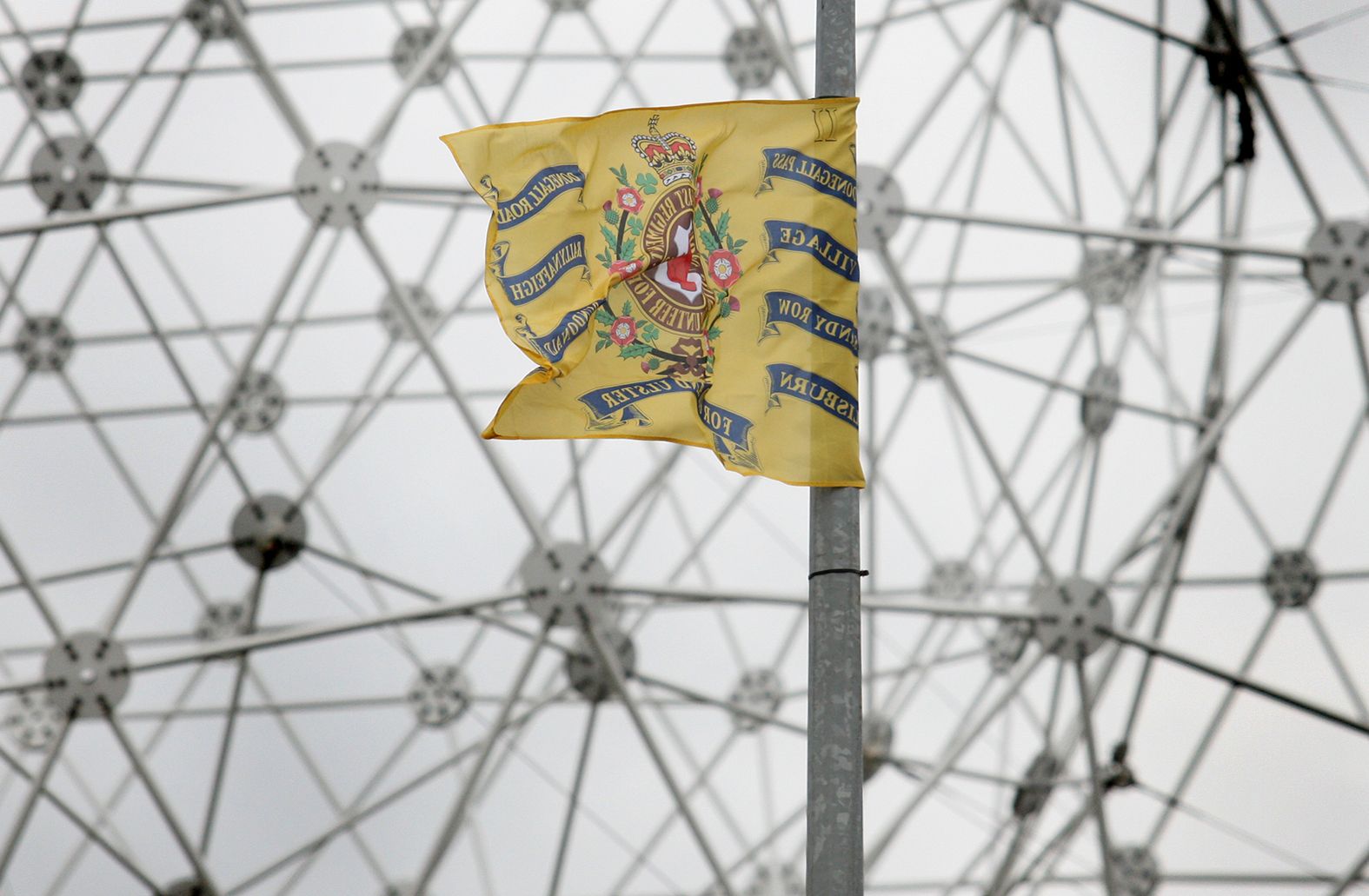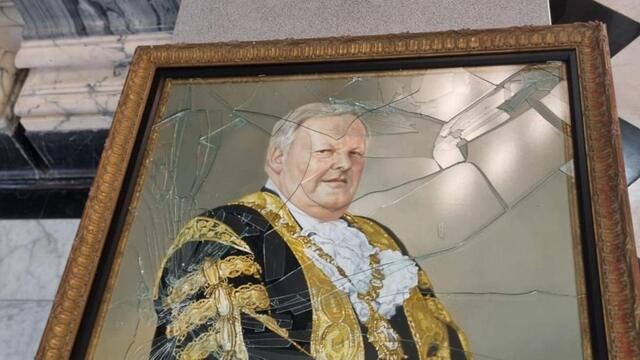RODNEY Edwards reported in the Sunday Independent at the weekend that DUP leader Sir Jeffrey Donaldson had met the Loyalist Communities Council just hours before he took the decision to sack First Minister Paul Givan.
*What’s that? Mr Givan wasn’t sacked, he resigned? Really? Try watching his ‘resignation speech’, in which he didn’t actually resign, came close to tears and then left before his leader spoke.
Squinter has no way of telling whether what the LCC told him proved decisive in Jeff’s decision to blow the house down – or at least to rattle the doors and windows a bit – but it does seem that the party has developed something of a habit of meeting the representatives of loyalist paramilitaries when loyal Ulster is in trouble. You never saw the DUP meeting the LCC during the good times: when Ian Paisley was on elephant safari in Sri Lanka or ordering Theresa May to put the kettle on; when DUP Spads were ringing round their mates and families telling them to fill their boots with RHI dosh; when Moy Park were giving them extra-large turkeys for Christmas; when somebody slipped them half a mill for a Brexit ad in a London paper. Nope, the DUP are strictly foul weather friends of the LCC, consulting them only when the blue skies of Ulster turn grey.
It may be advantageous here to point out for the benefit of the few who don’t know that the LCC represents the UVF and the UDA, though we haven’t been told yet why the DUP think these fine bodies of Ulster manhood should have a say in how a political party goes about its business. After all, the UVF/UDA don’t represent small business, unless you consider selling crack cocaine and horse tranquillisers to your neighbours to be small business. They do not represent victims and survivors, although, to be fair, they are pretty good at making them. They do not represent schools and teachers, although they’re pretty good at schooling people in putting out Catholics and teaching them how to get rid of the ethnics. And they don’t represent health workers, although they’re very good at keeping them busy.
The DUP say enigmatically that they meet the UVF and UDA because they’re ‘stakeholders’; but in what, exactly, do they have a stake? What are their fields of interest, apart from appearing on the front of the Sunday World and Sunday Life every week and flying to Turkey to get their teeth enamelled?
My Cousin Binny turns his sights on @KarenSethuraman - Ireland's first female Baptist minister - and others pile on. Flailing around, inventing enemies because there's too much anger and spite for the ones they've already got. What a truly bleak and dark development.
— Squinter (@squinteratn) February 12, 2022
The DUP meeting the LCC is kind of a regular thing now for the very simple reason that the DUP getting into soapy bubble is also kind of a regular thing now. Arlene Foster, Gavin Robinson and and Nigel Dodds met them last February for what the party described as “constructive and useful” discussions on the Protocol. This was shortly after LCC Chairman David Campbell promised loyalists would “fight physically” to defend “freedoms” in the United Kingdom. The upshot of that was that Arlene was dumped as leader and she’s now a warm-up act for Nigel Farage on a TV station nobody watches; and far from the Protocol getting dumped, we’re told that any day now lorry drivers and passengers on ferries arriving in the North are to be searched for ham sandwiches and fruit.
Which is why Sir Jeff went back to the LCC last week and which is why the story appeared on the front page of the Sindo. Interestingly enough, other Sunday paper front pages on the very same day turned their attention to the loyal sons of Ulster, viz: 1. A woman claiming a senior UVF man smashed his way into her home, leaving her traumatised and terrified. 2. A report that the UDA have begun sourcing their drugs from Mexican cartels.
Ay caramba!
So what’s all this about whataboutery then?

SO what about whataboutery?
There’s barely a political argument to be had these days which isn’t almost immediately dragged down by allegations of whataboutery.
“I think the latest news about what’s happening in Yemen is very worrying.”
“Yeah, but what about what the Russians are doing on the Ukraine border?”
It’s a bit like Godwin’s Law, which rules that the longer an argument goes on the more likely it is that somebody will reference World War Two or the Nazis. Just as it’s generally accepted that resorting to Nazi references in an argument about, say, Covid, is not good craic, there’s virtual unanimity that whataboutery is A Bad Thing. Squinter says virtual unanimity because there’s at least one person who thinks whataboutery is a perfectly valid conversational gambit – and that one person is Squinter.
Now don’t go getting the wrong end of the stick, Squinter’s not saying that the tactic of refusing to address a point by referencing another is either positive or helpful, but the fact is that there are two types of whataboutery: what might be called legitimate and illegitimate whataboutery.
Illegitimate whataboutery.
At the risk of sounding self-pitying, Squinter gets quite a lot of this as someone who writes a fair bit about politics both in print and online. So an exchange might go something like this:
– It’s positive news the commanding officer in Ballymurphy on the day of the 1971 massacre is to be questioned about the killings.
– Yeah, but what about what the Ra did on Bloody Friday?
Superficially, of course, that’s a persuasive argument, regardless of what side of the political aisle you find yourself on. After all, it’s beyond argument that bad things happened on all sides. But the flaw in that argument is that Squinter has never supported bombing the city centre; he’s never been in the Ra; or if SF/IRA is your preferred nomenclature, he’s never been in Sinn Féin. In short, Bloody Friday has got precisely nothing to do with Squinter, unless the argument is that all Irish republicans are required to answer for everything Irish republicans ever did.
Legitimate whataboutery.
Apologies again for putting yours truly at the heart of this narrative, but Squinter thinks legitimate whataboutery is a valid debating gambit for the very simple reason that he does it himself. So:
– It’s revolting to see Sinn Féin members pay tribute to an IRA killer.
– Mate, you literally stood grinning like a Cheshire cat under a banner in Derry paying tribute to the Parachute Regiment.
This is a classic piece of whataboutery Squinter has indulged in on more than one occasion and the reason he has is because it makes perfect sense. People have a right to object to people commemorating their dead; it’s not something that keeps Squinter up at night, but many do feel strongly about this sort of thing. But when you’re objecting to someone paying tribute to someone and you pay tribute to the Paras in the city where they carried out the most notorious atrocity of the conflict, well… not only are you fair game for whataboutery, it would be absolutely remiss of Squinter and others not to question your bona fides on the subject of commemoration.
Shocking the whataboutery I’m hearing on the radio this morning collusion is not an illusion it goes back to the formation of this state and further it wasn’t done to end the conflict it fuelled it . It has always been in the armoury of the British it’s not unique to Ireland
— Paddy McMenamin (@PaddyMcMenamin2) February 8, 2022
This is not a new concept. Politics has advanced a lot in recent years in relation to morality. Once upon a time a politician would be out on his ear (for it was always men) in a day if he cheated on his wife. Now nobody cares. A Taoiseach, a President or a Prime Minister will survive doing the dirty, although of course there’ll be tabloid interest in it. But if they’ve spent their political careers promoting Victorian family values then natural justice demands that they are brought to account.
And while Squinter’s perfectly entitled to make political points without being accused of having been the OC of the Belfast Brigade, if and when he starts accusing others of drinking too much beer and spending too much money in the bookies, feel free to ask him what that’s all about.
Desperate Dan has been at it again

THE competition for most embarrassing Brexit cheerleader is intense, but when the race is run and the results are in, Squinter’s sure that former Tory MEP Daniel Hannan is going to be somewhere on the winners’ podium – and that some-where will be standing on the high block in the middle.
The list of bum-clenchingly embarrassing gaffes he has racked up in seven years of bigging-up the Brexit project as Commander-in-Chief of the ‘Project Fear’ Brigade is truly, bleakly impressive.
Forced to dip his toe in the strange and dangerous waters of Irish politics, he once claimed Fianna Fáil had won every election in Ireland between 1932 and 2008, which would be bad enough, but when he was mercilessly mocked online he told an Irish journalist he had “a double first in Modern History from Oxford”. We can only hope he got his degree before university charges were introduced.
Variously, he has claimed that Italy was about to dump the lira; that the UK didn’t need to import lettuces because farmers would start growing them indoors; that the fishing industry was a massive opportunity for the UK as guts and scales could be used to make beauty products. *Please note fishing represents 0.03 per cent of the British economy.
In an attempt at old-ladies-cycling-to-evensong-service, cricket-on-the-village-green patriotic English whimsy he once tweeted picture of a hawthorn in full bloom beside a rustically-gated field: “15 miles up and down over Hampshire’s sloping fields, pausing for a pie at the Vine in Hannington. God, I love England in May.” Turns out he lifted a random picture from the internet and the tweet, like those previously mentioned here, was quickly deleted.
Now Dan has weighed in on the cost-of-living crisis, which, true to form, he has managed to place at the door of pinko Remainiacs.
“Now watch,” he tweeted, “as people who have spent the past year warning about free trade agreements ‘flooding’ us with ‘cheap food’ suddenly pivot to complaining about rising food prices.”
Let’s set aside the fact that it is perfectly possible to complain about cheap food and rising prices at the same time and consider the facts of the matter.
Nobody with a titter of wit opposed trade deals bringing “cheap food”; what they opposed was trade deals bringing food that is considerably less regulated than EU food, chlorinated chicken being the best example. The reason US chicken is so cheap is that business there is king: regulation is opposed at every turn, and where regulations are unavoidable (the food industry being the best example) they are as light-touch (ie, cheap) as possible. And since keeping germs and faeces off chicken by having scrupulously tight hygiene practices, as the EU does, is more expensive, US chicken producers are allowed to hose their chicken with chlorine to kill the germs and faeces after processing.
So when Dan next goes for an early-summer stroll through an English field that’s not actually in England, he might finally find things have changed for the worse in Brexit England if his pie in the village pub is chicken.







